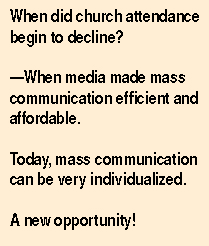2x2virtualchurch doesn’t get a lot of online engagement. But people do contact us. We get direct emails and sometimes even phone calls about our posts. When I encourage readers to comment on site, they say it’s too hard from their mobile phones—which tells us something about how the world gets their information today! Easier to use that phone to autodial us!
Friday’s post drew a phone call that raised an interesting question. It is a question that no one has probably thought about, because there was little need.
Our post advocated for “repurposing” the sermon.
The sermon, always central to Lutheran worship, is very ineffective for the purpose of spreading the Good News. Yet it is a focus of our expectations and budgets.
Most churches say something in their mission statements about reaching beyond that limited audience. Yet finding a way to do that has been a challenge, despite the tools in our modern hands.
Sermons—even great sermons—aren’t going to do it! Our post began exploring ways to maximize a congregation’s investment in providing a weekly sermon to a shrinking, limited and static audience of people who are predisposed toward the message. Our reader raises this question:
Who owns the rights to the sermon?
The caller is well-versed in both the corporate and church publishing worlds, especially the higher end of the Protestant Church. She commented that in the corporate world, if the corporation subsidizes the creation of content, the corporation owns the content. We are guessing the church world will argue that the pastor is self-employed and therefore owns his or her words.
I am self-employed but I know from experience that my clients consider my work to be their property. I often know that I have legal rights to the work product, but usually decide to not argue with clients. I value the relationship and the next job above the value of past work and insistence on accepted professional rights.
All this thinking may belong to the past—when publishing was the business of publishers. Today every evangelist or entrepreneur must publish if they hope to succeed. Hair dressers, chefs, dog trainers, roofers, lawyers, doctors—everyone will publish.
Congregations can (and we would argue MUST) be publishers. (Click to tweet)
What roadblocks will congregations encounter when they try to get more mileage from their considerable investment in spreading the Good News? They will have to get content for their evangelism efforts. Can they rely on the cooperation of clergy? Will everyone be stepping on toes? Will congregations seeking to call pastors insist their candidates understand modern publishing? They should.
The question probably enters no one’s mind now. As it is, very few pastors publish. Those that do are likely claiming all royalties without anyone questioning who subsidized the time they took in writing the book.
Will pastors value relationship over work product? Will they argue that Jonathan Edwards published his sermons for his own benefit and therefore they have the same rights? I don’t know the answer, but it is something to think about as congregations — like everyone in the modern world — realize that they have the power and need to publish. Publish or perish, for real!
These will be refreshing legal battles after the church has wasted so much of its resources in arguing about physical property, land, and monetary assets. Maybe church leaders will at last realize that their message is a major asset!
Realize this. A congregation’s content could fund their ministry. (Click to tweet.) They must create and own their content.
This is a game changer. It can be the salvation of the small church. If we make it a contest, all will lose. Congregations should think about this now before their regional bodies start to tweak their constitutions to favor them and the clergy. Clergy are a pretty big voting bloc in that regard.
Congregations must become involved in any upcoming debate. They may have to spark the debate or watch decisions made for them — and not in their favor!
This has happened before. The Lutheran Church in America (the predecessor body of the Evangelical Lutheran Church in America) forbade congregations from publishing. It was seen as competition with the national church publishing houses. Now there is no way to stop congregations from publishing.
Denominational leaders will be shooting their mission in the foot if they start to legislate these rights in their favor, but they’ve been doing this in their lust for land for years.
Prediction: This is going to change—dare I say transform—the relationship of congregation and clergy. (Click to tweet)
Congregations, think about this now! If your next pastor is uncomfortable with publishing and uncomfortable with others in the church becoming involved in publishing, they will be unprepared to bring your congregation into the future.




